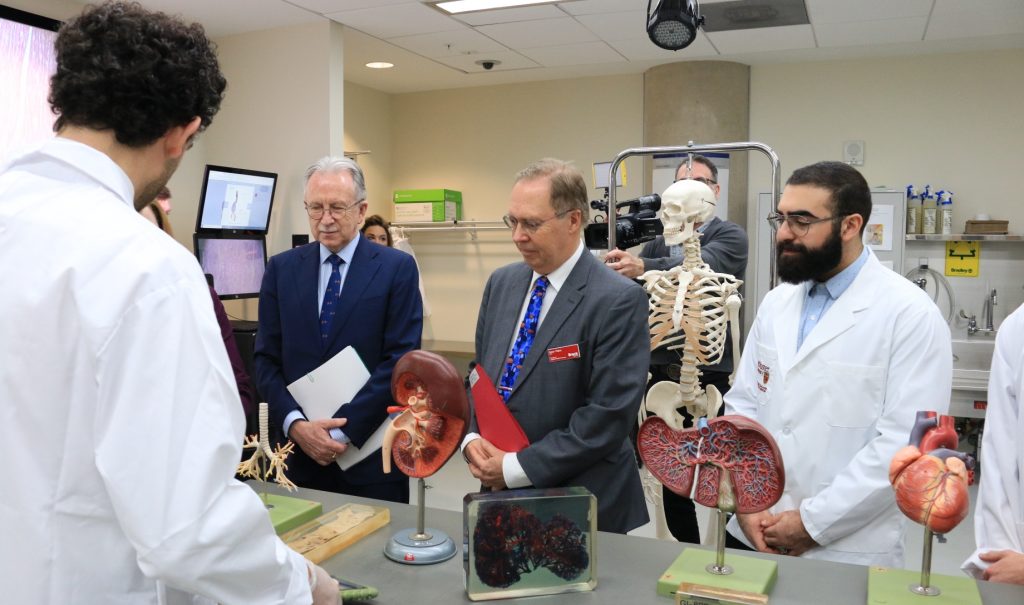Brock and McMaster renew health sciences collaboration

From left, Paul O’Byrne, dean and vice-president of McMaster University’s Faculty of Health Sciences; Peter Tiidus, dean of the Faculty of Applied Health Sciences at Brock University; and McMaster medical student Ali Beydoun listen to Andrew Palombella of McMaster’s anatomy department at the event to sign the collaboration agreement between the Niagara Regional Campus of the Michael G. DeGroote School of Medicine and Brock University. (Photo by Tina Depko/McMaster Health Sciences)
McMaster University and Brock University have renewed an agreement that has seen more Niagara-trained doctors practising in the region.
Since McMaster’s Niagara Regional Campus moved into space on the Brock campus in 2012, more than 30 physician graduates and 30 medical residency graduates have begun practising in the region.
The renewed agreement provides the framework to continue the partnership and to expand its benefits to students of the two universities.
More than a renewal agreement, the signing marked a commitment to expand the academic collaboration between the two institutions.
“This is a unique partnership between two universities,” said O’Byrne.
“Not only are we sharing space on the Brock campus, but we also share learning resources as well as collaborations in teaching and research and in exploring health career pathways.”
The 9,000-square-foot McMaster campus is currently the educational home for 84 undergraduate medical students and 26 medical residents who are doing their clinical and specialty training at Niagara Health.
McMaster’s Niagara Regional Campus of the Michael G. DeGroote School of Medicine is located in the Roy & Lois Cairns Health & Bioscience Research Complex on Brock’s main St. Catharines campus.
Since moving to Brock from the former St. Catharines General Hospital in 2012, the medical school campus has graduated 208 medical students, 80 family medicine residents, seven emergency medicine residents and two general surgery residents. More than 60 of them have stayed in Niagara to practise.
“Brock University holds as a key priority the contributions it makes to enriching and strengthening communities across the Niagara region,” said Brock President Gervan Fearon.
“It’s difficult to imagine a more important way of impacting peoples’ lives than by helping improve their health care, including the training of health professionals right here in Niagara. Brock is pleased that our partnership with McMaster University facilitates us in making this contribution, as well as establishing a new scope for building on our shared successes.”
Peter Tiidus, dean of Brock’s Faculty of Applied Health Sciences, said the partnership is a benefit to Brock students because they are able to access McMaster’s anatomy lab and other resources.
“The unparalleled access by our undergraduate students to the McMaster human anatomy facilities, coupled with our other extensive and hi-tech anatomy teaching facilities makes our anatomy instruction and student learning experience among the very best in Canada,” he said.
“It’s an enriched environment,” said Amanda Bell, regional assistant dean of the Niagara Regional Campus.
“In the past, our collaboration has included both joint clinical and international health learning opportunities as well as joint research projects. We’re looking forward to future partnerships between our programs on issues such as the health of marginalized populations, and on joint symposia.
“We appreciate the opportunity of our medical students to feel part of the university community life here; it’s a beautiful campus,” she added.

